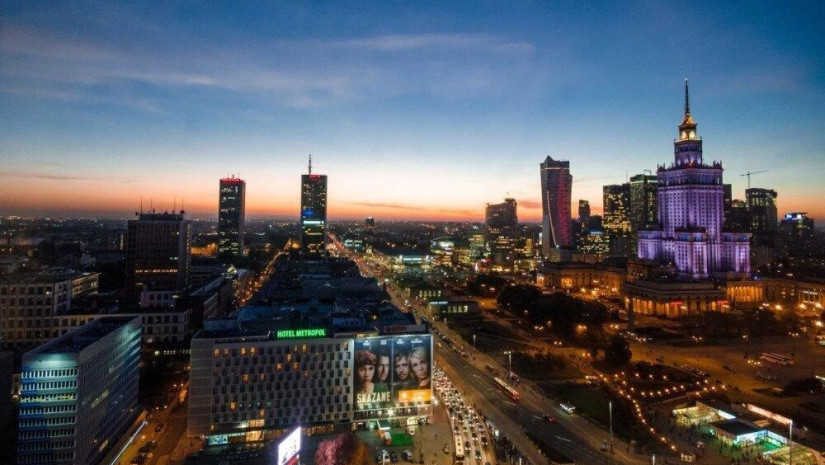Polish stocks are the world’s worst performing equity market this year, highlighting Poland’s vulnerability to the war in Ukraine and Europe’s energy crisis as well as fears of more government intervention.
Poland is classified as a high-income economy by the World Bank, ranking 20th worldwide in terms of GDP (PPP) and 22nd in terms of GDP (nominal). Poland has a highly diverse economy that ranks 21st in the 2017 Economic Complexity Index.
The economy of Poland is an industrialized, mixed economy with a developed market that serves as the sixth-largest in the European Union by nominal GDP and fifth-largest by GDP (PPP).
Poland WIG20 companies are trading at 5.8-times this year’s projected earnings, the lowest valuation since the index was launched in 1994.
Historically and according to Bloomberg data, buying or investing in the world’s worst performing stock market has often led to what an economist would refer to as “ reversion to mean”. If the country does not disappear or go bankrupt, could asset prices recover ?
EPOL is the United States listed iShares MSCI Poland ETF and an efficient and cost-effective investment vehicle through which to express a view on polish assets and the WIG index and MSCI Poland index.
The WIG20 is a capitalization-weighted stock market index of the twenty largest companies on the Warsaw Stock Exchange. WIG is an acronym for "Warszawski Indeks Giełdowy", which translates to Warsaw Stock Index in Polish.
Poland is the fifth-largest European Union member by population 38 million , has seen a pattern of declining numbers of inhabitants in recent years, much as many of its peers have experienced. But that all changed in 2022 due to the unfortunate war in Ukraine and Poland accommodating more than 2 million Ukraine refugees.
Chicago in the United States is a city with many polish immigrants. The U.S with a history of Polish migration dating back to the 1830s – and more than one million people of Polish descent in its metropolitan area today – Chicago is the traditional capital of the Polish diaspora in the United States.
Similar to the U.S in the old days, immigration can be a positive for the economy and country’s longer-term potential. Poland is in a shift that’s set to reshape this eastern European economy and give economists another supply-side shock to pore over.
Poland is accommodating more than 2 million refugees, an astonishing number for a nation of 38 million. And the Poland stock market trades at levels of the lowest valuation since the index was launched in 1994.
Poland’s government, as well as its employers, want as many Ukrainian people as possible to stay for good. In relief kitchens, hostels, clinics, and welfare offices, Polish society is sparing no expense to make Ukrainians feel welcome:
The macro picture hasn’t been so gloomy in years, with war raging in neighbouring Ukraine and inflation surging to 16.1% in August, the highest level since 1996. The economy is set to slow and may enter a technical recession amid weaker demand from local consumers and Poland’s main trading partners in the European Union.
All of this means that WIG20 companies are trading at 5.8-times this year’s projected earnings, the lowest valuation since the index was launched in 1994. Patient and long-term investors might be rewarded by considering Poland as small part of globally diversified long-term investment portfolios. And buy the world’s worst performing market in small tranches to build an investment position for once the war or special military operation in Ukraine is over.
Foreign investors are worried about Poland’s status as a frontier country to the war in Ukraine and state interventions in the biggest-listed companies, while higher domestic interest rates have attracted local savers and investors.
EPOL iShares Poland offers a dividend yield of 2.9% in U.S. dollars. EPOL closed at $12.38, with a year-to-date loss of -40.68.
Last but not least, Poland has unveiled a long-awaited parliamentary report claiming Germany owes it 6.2tn zlotys (€1.3tn) in reparations for the damage and losses the country suffered during the second world war. The war in Ukraine has exacerbated tensions between Warsaw and Berlin, which were already high because of Polish claims that Germany was abusing its dominant position within the EU, notably over the perceived erosion of the rule of law in Poland.
President Putin’s Russia has argued that Poland should instead pay Moscow for the liberation of the country at the end of the second world war, when the Red Army advanced through Poland on its way to Berlin.
Foreign investors are worried about Poland’s status as a frontier country to the war in Ukraine and state interventions in the biggest-listed companies, while higher domestic interest rates have attracted local savers and investors.
Polish banking stocks may become more interesting as banks may pay existing and new savings to 7-8% annually. Banks account for 25.99% allocation in the Poland ETF EPOL, representing the largest sector allocation.
A meaningful and significant rebound in polish assets is unlikely until investors get a better sense of how Europe will survive this winter’s energy crisis, and how or whether the Ukraine war could come to an end.
Rainer Michael Preiss is Partner & Portfolio Strategist at Das Family Office in Singapore.















